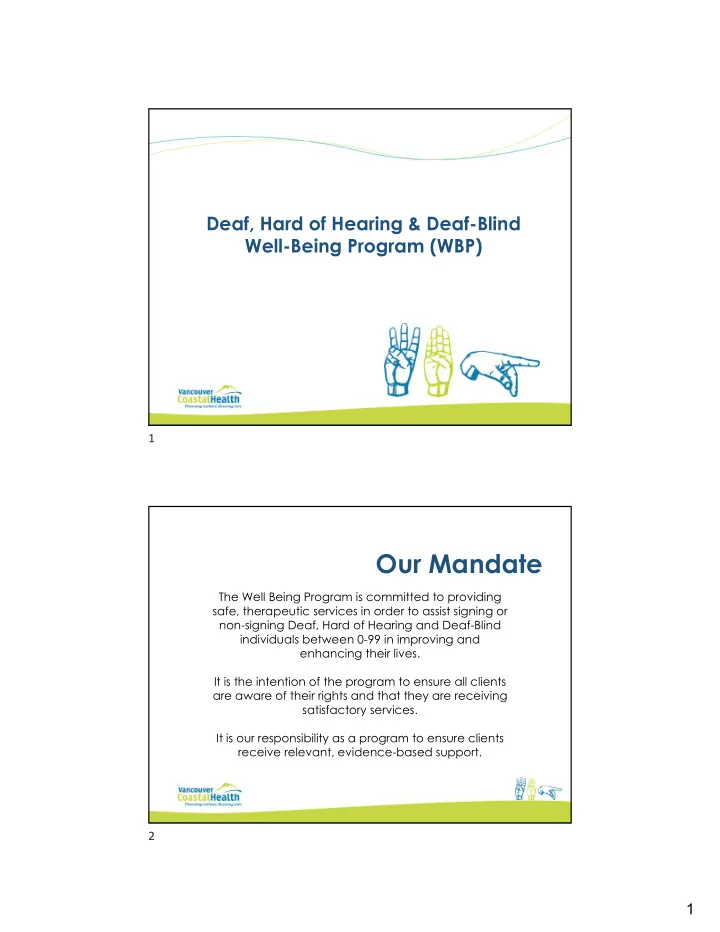

Deaf, Hard of Hearing & Deaf-Blind Well-Being Program (WBP) 1 Our Mandate The Well Being Program is committed to providing safe, therapeutic services in order to assist signing or non-signing Deaf, Hard of Hearing and Deaf-Blind individuals between 0-99 in improving and enhancing their lives. It is the intention of the program to ensure all clients are aware of their rights and that they are receiving satisfactory services. It is our responsibility as a program to ensure clients receive relevant, evidence-based support. 2 1
WBP Funding • WBP is 100% funded by MCFD (via Provincial Deaf and HH Services) • Vancouver Coastal Health manages the contract • We report to MCFD twice a year – Client statistics (number and age of clients, geographical location) – Outcome measurements – Testimonials from consumers 3 Deaf Well Being Program Community Education and Infant, Child and Services Youth Services (0-18) Adult Senior Services Services (19-65) (65+) 4 2
What Services WBP Offers: • Intake and referral assessments • One on one/group therapy (CBT, DBT, anger management) • Consultations to other service providers • Liaising with other health authorities • Addictions and rehabilitation support and access • Mental health interpreting • Psychiatric assessments • Behavioral consultation • Community education and workshops • Case management support • Referrals when appropriate • Peer support workers 5 Let’s Refer! • Direct contact to Program Coordinator Kristen Pranzl • Deafwellbeing.vch.ca- we have our referral forms online! • When in doubt- send an email or text to check in if the referral is an appropriate one. • If the parent is asking for the referral, please encourage them to talk to their child (age/if appropriate) and share the reason why they feel the child would benefit from WBP services 6 3
Examples of Referrals • One of the major underlying reasons for referrals to WBP has to do with understanding one’s identity, acceptance of that identity and sense of belonging to a particular group and/or community • Children of Deaf parents may be referred for counseling to explore their dual identity • TDHH’s might identify some students that are struggling with their identity as a deaf or hard of hearing individual. WBP sees many referrals for hard of hearing, non-signing students around 11-14 years old. • TDHH’s also refer students that might be experiencing personal life crises (parents separating, moving from a different city/country) 7 Benefits of Referrals • We get many referrals from TDHH’s for students • Our program can become part of the support team that encourages families to be curious about their options and/or accept that their child is curious about their options. • We also support families with accepting and recognizing their feelings and/or grief about their child’s diagnosis and what it means for their family. • We are a multidisciplinary program with staff who offer different skills and personal backgrounds. Families enjoy coming in and seeing what their child can potentially grow up to be. 8 4
In-House Staff at WBP • Program Coordinator • Psychiatrist (once weekly) • Child and Youth Clinician • Family Support Worker • Adult Mental Health Clinicians • Itinerant Mental Health Clinician – Focus on developing and strengthening provincial focus – Liaise with other service providers in different regions • Mental Health Social Workers – Focus on supporting clients navigate systems – Access and advocacy within the system (BC Housing, detox, addictions, Community Living BC) 9 Contact Information • Kristen Pranzl (Program Coordinator) – Kristen.pranzl@vch.ca – TEXT 604 306 7633 10 5
Recommend
More recommend